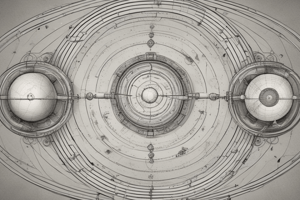Podcast
Questions and Answers
What did Galileo Galilei discover about the movement of objects down inclined planes?
What did Galileo Galilei discover about the movement of objects down inclined planes?
- The velocity of the ball changed because the speed of the ball was changing (correct)
- The objects moved at a constant velocity regardless of the incline angle
- The acceleration of the objects remained constant throughout the motion
- The mass of the object affected its velocity on the incline
What is the concept of inertia?
What is the concept of inertia?
- The ability of an object to maintain a constant speed
- The force exerted by an object in motion
- An object's tendency to resist change in its state of motion (correct)
- The measure of an object's velocity
What did Galileo's experiments with inclined planes demonstrate?
What did Galileo's experiments with inclined planes demonstrate?
- The relationship between mass and velocity
- The rate of change of velocity, known as acceleration (correct)
- The impact of friction on velocity
- The constant speed of objects on inclines
How did Galileo support his scientific conclusions?
How did Galileo support his scientific conclusions?
What describes acceleration?
What describes acceleration?
What was one of the reasons for Galileo's success as a scientist?
What was one of the reasons for Galileo's success as a scientist?
What is the difference between speed and velocity?
What is the difference between speed and velocity?
What is the formula for acceleration?
What is the formula for acceleration?
If a car steadily increases its velocity from 20 km/h to 60 km/h in 3 seconds, what is its acceleration?
If a car steadily increases its velocity from 20 km/h to 60 km/h in 3 seconds, what is its acceleration?
What is the acceleration of an object in free fall when air resistance is negligible?
What is the acceleration of an object in free fall when air resistance is negligible?
When a car decelerates, it means that the car's:
When a car decelerates, it means that the car's:
What is the change in velocity for an object that goes from 10 m/s to 30 m/s in 5 seconds?
What is the change in velocity for an object that goes from 10 m/s to 30 m/s in 5 seconds?
If an object's velocity changes by 5 m/s in 2 seconds, what is its acceleration?
If an object's velocity changes by 5 m/s in 2 seconds, what is its acceleration?
What is the acceleration of an object that steadily increases its velocity from 12 km/h to 36 km/h in 4 seconds?
What is the acceleration of an object that steadily increases its velocity from 12 km/h to 36 km/h in 4 seconds?
If an object's velocity changes by 15 m/s in 5 seconds, what is its acceleration?
If an object's velocity changes by 15 m/s in 5 seconds, what is its acceleration?
Flashcards are hidden until you start studying




